Odds and
Sods, Memphis Edition
Bands
reviewed
on this page: Cargoe,
The Hot Dogs, Prix, The Scruffs, Van Duren, The Yankees.
First Wave - Big Star Contemporaries
Cargoe
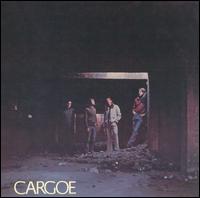 Cargoe (1972),
***1/2
Cargoe (1972),
***1/2
I'm not going to run through all the arguments, but you can make a
solid case that Cargoe was the most important band on the Ardent label
at the time. The Tulsa transplants' lone album was Ardent's
best seller, and their single was a serious contender. This
article does a superb job with the band's story, so I will gloss over
most of it.
Cargoe did an admirable job blending power-pop melodicism with various
contemporary sounds - late Beatles, post-CS&N and Traffic
soft/folk rock, blues lead guitar and some country sounds.
Listening to the album, the band sounds like a bunch of Southern boys who loved the Beatles
and others, and went in a different direction. Southern rock
were their brethren, (you can hear it on the vocals, the acoustic
guitar bedrock and the blues-rock guitar leads), but instead of
founding a new tribe, Cargoe became a curious attempt. Had
they become more popular, they might have been the American Badfinger,
but even better. You can sit down and figure out a Badfinger
song relatively easily - Cargoe's songs are more complex and have
excellent arrangements, probably the result of years of live playing
and recording an earlier version of this album.
The mixture is pretty adventurous, and probably would have been the
"smartest" mainstream album at the time, avoiding repeating their
playing from verse to verse, such that songs go in unexpected places
("Feeling Mighty Poorly". The album's single "Feel Alright"
is a great example: it sounds like a late 60s country-rock band
recording a power-pop single - good vocal harmonies, bluesy lead
guitar, a great syncopated chorus. The band had good verve -
"Thousand Peoples Song" is built on a great riff, and introduces some
saxophone, and "Come Down" has similar tendencies. Their
harmonies, quieter sections and acoustic reliance strongly echo
CS&N ("Horses and Silver Things" "Heal Me", "Feeling Mighty
Poorly"), but not in a purely derivative manner. Their
ballads are also a bit different: such as "I Love You Anyway", a
harmony number with a gentle swinging 6/8 beat, but also synthesizer or
mellotron in the background.
The public liked "Feel Alright" as well, the problem was Ardent's
failed distribution stranded it. A album with many
ideas
and good playing, Cargoe
became orphaned; a signpost for sounds unrecorded.
The Hot Dogs
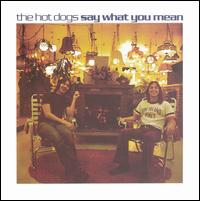 The Hot Dogs: Say What You Mean
(1973), **1/2
The Hot Dogs: Say What You Mean
(1973), **1/2
One of the ad
hoc groups recording at Ardent in the early seventies, along with Rock
City and Big Star, the Hot Dogs were Greg Reding (guitar, keyboards)
and Bill Rennie
(vocals, bass), and their debut is straightforward: acoustic pop songs
supplemented with session players on lead guitar, drums, etc.
Their sound is much lighter than Big Star as Rennie's acoustic riffs
draw from the folk/singer-songwriter appeal of AM
gold.
The
laid-back early 70s vibe permeates most the album, similar to a less
talented Traffic ("Thanks", the jazzy section of "Morning Rain"), and
some of the folk-pop songs are fine ("Let Me Look at the Sun", "When I
Come Home Again", "Way to Get to You"). Still Terry Manning's
lead guitar is far more blues-rock than the Star gents', and the Hot
Dogs' better tracks are those that rock a bit ("Time Is All", "Let Me
Look at the Sun", "Lowdown"). Manning keeps the production
pretty basic, adding strings occasionally, and the albums get better
the more I listen to it, although hardly a masterpiece. It
may be a bit bland, but it has more character than most whitewashed
guitar
songs of the period. The band added Fred Prouty on drums and
Jack Holder on guitar at some point, and both appear on the album,
along with other locals such Robert Johnson and the ubiquitous Richard
Rosebrough.
Second Wave - Big Star Followers
Prix
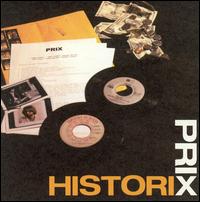 Prix: Historix (rec.
1977-78?, rel. 2002), ***
Prix: Historix (rec.
1977-78?, rel. 2002), ***
Much
like the Hot Dogs, Prix was a Memphis
studio band; this one centered around singer Tommy
Hoehn, guitarist Jon Tiven and bassist Rick Clark. The first
two
were tied in with Big
Star
-- Hoehn having sung backup on 3rd, and Tiven
producing Chilton's Bach's Bottom
sessions. Interestingly enough, both Chilton and Bell are
credited with playing, and Bell produced at least some tracks.
My
low-quality internet research shows the band released one EP in 1977 (Girl)
and a single in 1978 ("Everytime I Close My Eyes" / "Love You
Tonight"), and this 11-track compilation collects all the
group
recorded.
For
their brief existence, Prix made some top-notch songs; "Girl", "She
Might
Look My Way", "Love You All Day Long" are all classics that
picked
up Big Star's power-pop sound, but not as frantic as
the Scruffs.
Hoehn in particular is excellent - he sings like
Eric Carmen riled up with a broken heart, and Tiven's guitar adds some
Allman Brothers to the Big Star sound. Since the band is
mostly
straight and heartfelt pop, it lacks the poignancy or chaos of Big Star,
much like the Scruffs' approach. (Of course, Chilton took the
other route -
half-assing and scuffing everything up). Since this is rather
off
the beaten path, most of the album may be superfluous as a good portion
of the
songs overlap with the Bach's
Bottom
sessions - "Every Time I Close My Eyes", "Take Me Home and Make Me Like
It", "Free Again" and "All of the Time" appear here. While
the
arrangements are the same and Hoehn hits the high notes easier than
Chilton, they lack Chilton's relaxed charm. But if
you want
more straight versions of those songs, you will find them here (despite
sound quality issues on a couple of tracks). Certainly a
minor
work of Memphis power-pop, but some songs are easily on par with more
familiar names like the Scruffs.
Tiven
next showed up with the Yankees, and Hoehn attempted a solo career.
Others involved include John Hampton on drums and Jonathan
Sanborn
on bass.
Scruffs
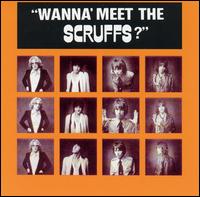 The
Scruffs: Wanna Meet
the Scruffs? (1977),
****
The
Scruffs: Wanna Meet
the Scruffs? (1977),
****
So,
if it's 1977, and you love power-pop, in a band, out of your mind
exuberant, one helluva songwriter, and in Memphis, then your album
sinks like a stone. Stephen Burns was that man and the Scruffs' lone
album made a plop, and then plunged. He and the other Scruffs (who
you do want to meet) obviously loved Big
Star
and other power-pop bands, but the Scruffs are a lot happier than
Chilton and Bell. The Scruffs were also more peppy, less
experimental, and less serious than Big Star. Think Big Star merged
with the Buzzcocks
("I've
Got a Way"): guitar power-pop with a sense of humor. I really
like it, even if their power-pop had been done before: songs about
girls, songs about problems with girls, songs about guns, songs about
being a failure or songs about fun or the lack thereof. You can play
spot the references if you want, but you should just enjoy the pile
of great songs. The band doesn't really change their approach, so
some tracks are just "more of the same", but I'm not going
to name them, because you might like them more than my favorites
("Break the Ice", "This Thursday", "I've Got
a Way", "Tommy Gun"). Just try avoiding singing
along, as the band is wonderfully consistent unlike the Rubinoos, and
more energetic than Shoes. "I'm only 23, and it's the end of
me" Burns sings on "I'm a Failure", and he nearly
proved to be right; a move to New York went nowhere, the band's later
recordings were shelved and he wouldn't release another album for
nine years. The original pressing of 2,500 LPs has now been
supplemented with a reissue and renewed interest, hopefully proving
Burns wrong.
I also have the band's demos (The Early Recordings) and their unreleased second album (Teenage Gurls). Burns released a further collection in 1998 (Midtown).
Van Duren
 Are You Serious?
(1977), ***1/2
Are You Serious?
(1977), ***1/2
Duren
played bass with a post-Big Star Bell and Stephens for a while in
Memphis, before recording this solo album with Jon Tiven as producer.
Despite his association with Big Star guys, don't expect
album
full of electric power pop - Van Duren was an unabashed pop artist.
He sounds a lot like a tougher Emitt Rhodes (which is to say
he
sounds a
lot like early Paul McCartney) but not as wed to Beatles circa 1966.
The album is a good mixture
of Rhodes-like basic pop songs ("Positive" "The Love That I Love"), to
slightly more grandiose pop ("Grow Yourself Up"), to power-pop
("Chemical Fire" - the best song on here, "Oh Babe", the Big Star-lite
"New Year's Eve"). The sound is straightforward - Duren
avoids a
lot of instrumental soloing, and with solid but unremarkable backing
(think Rough
Mix),
the album can sometimes sound vanilla. He also fell prey to
late 70s schlock
("So Good to Me", "Stupid Enough"). Even so, Duren
was light years ahead of schlock-meisters like Billy Joel, and it's a
shame this album never made an impact.
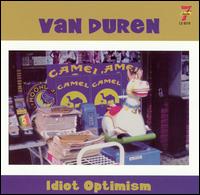 Idiot Optimism (rec.
1978-79, rel. 1999), **1/2
Idiot Optimism (rec.
1978-79, rel. 1999), **1/2
Duren
went for a slightly more contemporary sound here, using a more
disco-inflected rhythm section on some songs ("Bear With Me All the
Way", "That", "Woman Needs Man Needs Woman"). Regretfully, his
songs are not as strong this time around. Duren still
channelled Rhodes
("Andy, Please" - the punningly titled "Mabel (I'm
Amazed)") and used his excellent voice for some good songs - the
opening "Bear With Me All the Way" is a great pop song, as is "Woman
Needs Man Needs Woman", and his cover of Chris Bell's (then unreleased)
"Make a Scene". However, in keeping with the times, Idiot
Optimism
turns these pop tendencies towards schmaltz, such as "What's
Keeping You?" and "Reminds Me
of Me?" and uses some synthesizer sounds that anchors it to the late
70s. The guitar-rock songs such as "Convincing Convictions"
and "Life in Layers" are fine, but not at the level of Serious,
and the second half of the album is too trite. Still worth
hearing, and better than a lot of the crap from the era. The
album was unreleased at the time, but Terry Manning's Lucky Seven
records finally released in the U.S. in 2004.
The Yankees
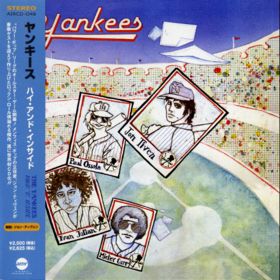 High 'n' Inside (1978),
*1/2
High 'n' Inside (1978),
*1/2
Jon Tiven's
New York group is sometimes classified as power-pop; it is not. The Yankees' sole album consists almost entirely of
annoying sub-Springsteen rock, recorded by what was possibly a talented
bar band. The material is almost entirely straight-faced
blue-collar songs about women, rendered even more vexatious by Tiven's
below-average baritone. Some Memphis influences appear -
female
gospel backing vocals (contributing to the crap roots-rock feel),
another rendition of "Take Me
Home and Make Me Like It" dosed with
slide guitar, and a reworking of Chilton's old "Free Again" into
"Everyday I Have to Cry", but not much else. (They also filch
from the Rolling Stones for "Something About You"). The
opening
track "Take It Like a Man" is the album's best (because it's actually
catchy), but demonstrates that Tiven lacks discernible qualities beyond
bravado; while singing about how he can take it like a man (don't think
too much about that phrase), and how you should go to him with your
problems, he goes right over slumming ex-Voidoid Ivan Julian's over the
top soloing, which is far more interesting than anything Tiven
contributes. The only other really tolerable track is "Boys
Night
Out" - another attempt at an guy's anthem, also cursed with Tiven's
voice. I realize mediocre traditional rock was popular at
this
time, but even by those standards this is bad.
The
re-release adds four additional tracks (other than an insufferable
modern rendition of "Take It Like a Man"), more ballad-like than the
album (but man-ballads). The only things of note - "You'll
Come
Back to Me" is so super-serious it makes me laugh, and "Wrong Side of
the Street" is an errant attempt to incorporate synth-rock into their
sound, with synthesizers and the drummer pretending to be a machine.
Beale Street is DONE. Return to the Music page.
 Cargoe (1972),
***1/2
Cargoe (1972),
***1/2 

 The
Scruffs: Wanna Meet
the Scruffs? (1977),
****
The
Scruffs: Wanna Meet
the Scruffs? (1977),
****

